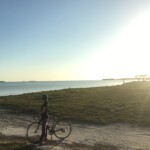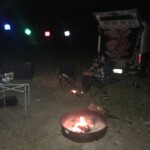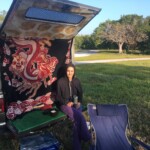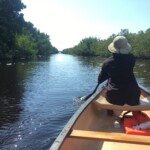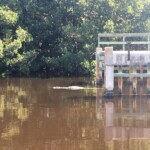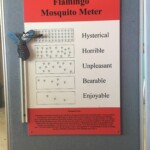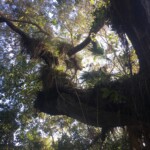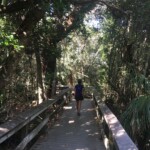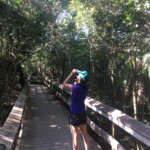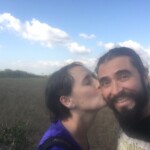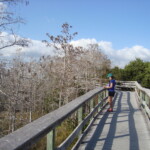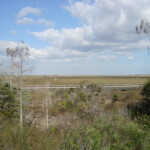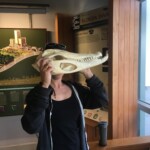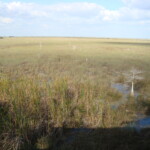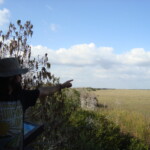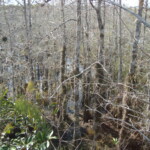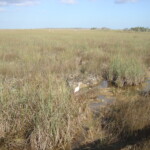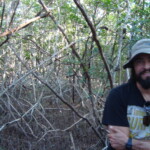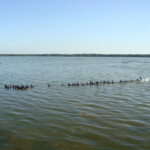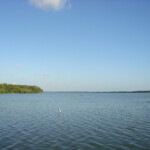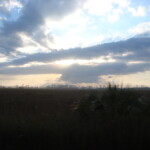Traveling to the Everglades was an eye-opening experience not only because of its natural beauty but also because of the grave environmental dangers it faces. It also gave us the opportunity to come face-to-face with one of the Everglades most iconic species …. the mosquito.
We packed the truck and left Key West somewhat disappointed to be leaving such an idyllic existence but nonetheless excited to be back on the road. After driving through the paved savannah that is southern Florida we finally made our way (after stopping to get several cans of mosquito repellent) to the Everglades National Park. Flamingo campground was not too busy but upon exiting the truck we soon discovered what our greatest danger would be and it wasn’t snakes or alligators or crocodiles. The mosquitoes descended upon us in an instant and we hardly had any time before we were being devoured. As we danced and hopped around swatting mosquitoes away from us we had only a few seconds to reach for the cans of insect repellent and spray each other head to toe thoroughly. We had also acquired a fogger which we used to spray the back of the truck and the general area of the campsite in hopes that it would keep some of the pesky insects at bay. However, it soon became fairly obvious that the best way to keep the mosquitoes away was to run like hell. So we hopped on our bicycles and went for a ride to try to evade the marauding swarm. After our ride we returned back to the campsite to try and enjoy dinner during the sunset but the bugs were just too much and we ended up escaping to the camper to try and avoid them. We both had a good chuckle at the fact that such a tiny little thing could be present in such great numbers that it was really like dealing with a force of nature.
The next day we tried to brave the swarm and take a canoe trip up one of the canals to try and see some wildlife. For the most part the snakes, crocodiles, alligators and turtles we were hoping to see eluded us. But what was present in vast numbers was, you guessed it, more mosquitoes. Despite the fact that we had drenched ourselves in another can of insect repellent they were still all over us so we turned around before reaching Coot Bay and tried to find some shelter in the concession area to avoid the skeeters and drink a beer. We were told by a park ranger that the mosquitoes were the worst they’d ever seen them but were much worse near the coast so we decided to head further inland to do some of the many interpretive hikes that the park offers. The hikes did indeed provide a little bit of respite from the swarming mosquitoes and the information that they provided was very educational (do YOU know what a “hammock” is?)  The interpretive hikes gave a great overview of the different ecosystems and landscapes in the Everglades and though we had to drive to each one we were glad for the break from the swarm. Once we were back that evening we again quickly made our dinner and ensconced ourselves in the relative safety and comfort of our camper.
The interpretive hikes gave a great overview of the different ecosystems and landscapes in the Everglades and though we had to drive to each one we were glad for the break from the swarm. Once we were back that evening we again quickly made our dinner and ensconced ourselves in the relative safety and comfort of our camper.
It should be apparent already that the dominant species in this national park during our visit was not the humans. We decided on the morning of her third day there to make a hasty escape, cut our losses and move on to the west coast of Florida where we would hopefully encounter less bugs. On the way out of the park we did stop in at the Ernest F. Coe Visitor Center where the main (and unfortunate) gist of many of the informational materials was the grave danger that the Everglades faces because of climate change, human development, and the many water issues that continue to plague this “River of Grass”. It was definitely bittersweet leaving such a beautiful place that we knew was under such intense pressures. As environmental professionals while we really enjoyed (mosquitoes aside) the natural beauty that the Everglades represents we also knew that the challenges it faces are drastic and perhaps insurmountable. We left happy that we had seen the Everglades but definitely afraid that this national treasure would not be around much longer to visit once again.



